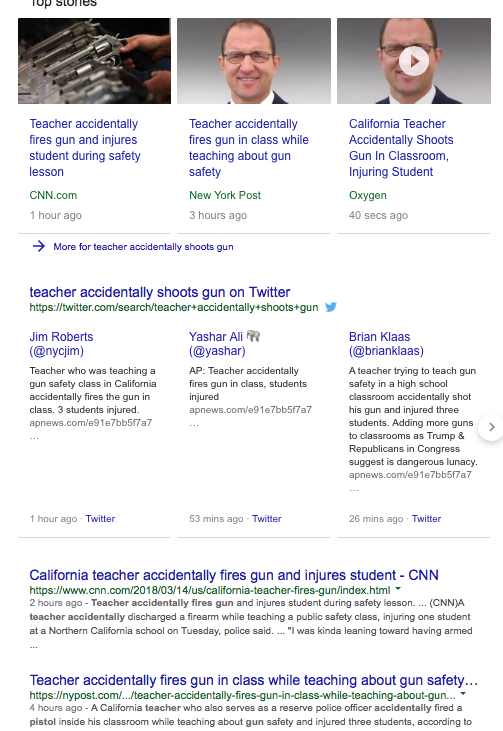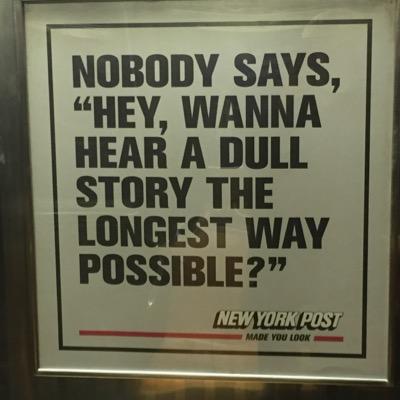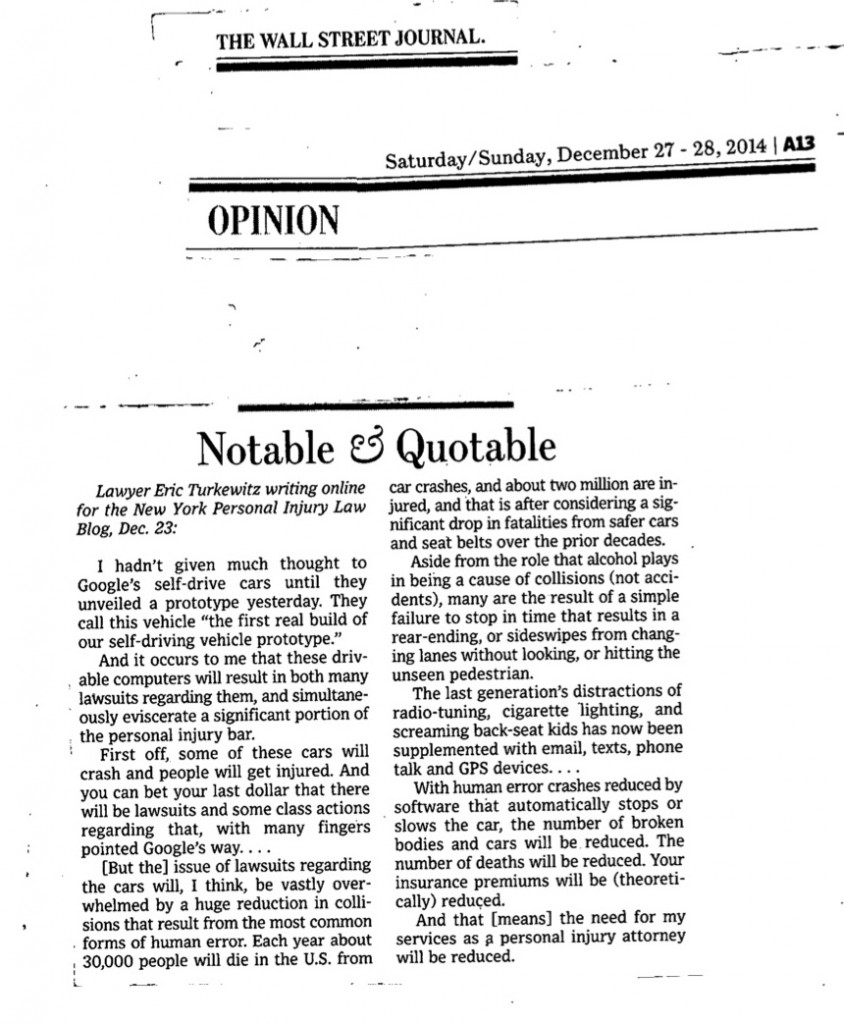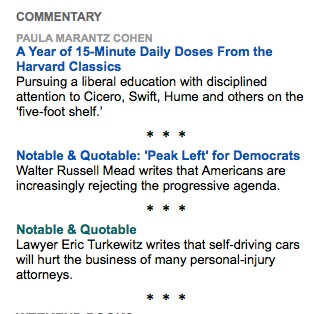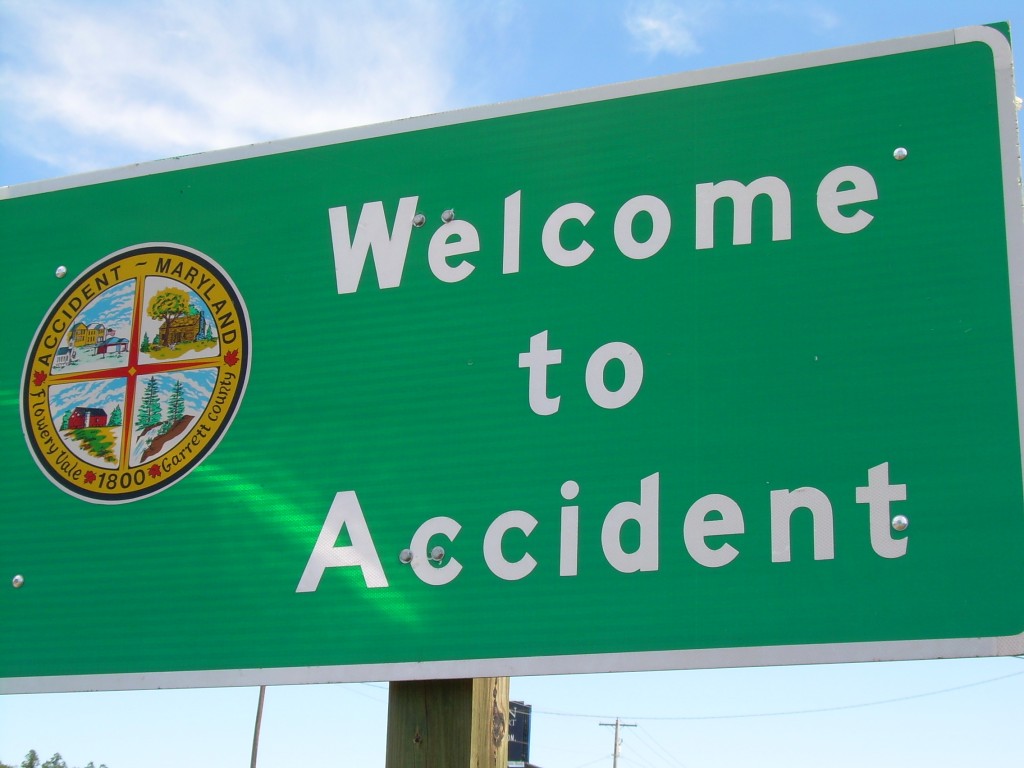
It’s a funny place to find a story on personal injury law — inside the pages of Outside Magazine. But when a good point is made, it makes no difference where that point is found.
Outside gets involved because the article is called: How We Talk About Drivers Hitting Cyclists. It seems that bicycle riders aren’t too keen on getting hit by vehicles that are much bigger than they are, and getting squashed or worse. And so, an outdoors magazine hits a junction with personal injury law.
Their story starts with a triathlete out for a spin getting bounced off the grill of a Ford F-150 and soaring through the air to an unhappy landing that was, thankfully, survived, albeit with significant injuries.
But the story isn’t really about that one rider, or the many other bicycle riders that have been hit and injured or killed by cars and trucks.
The story is about how the media writes about those crashes, with the subtle (mis)use of language leading to a shifting of blame, or a minimizing of the significance on how the crash took place:
News stories often play a key role in shaping public understanding of traffic safety. And when news stories victim-blame or fail to convey the larger context in which these crashes take place, they do deep injustice to the victims and the conversation about road safety in general.
In the past, I’ve noted that the word “accident” is a poor language choice to describe a motor vehicle collision or other mishap, as that word is the same one used for a deer that bolts into the road. Why use the same word for an unavoidable crash as you would for one that is avoidable with reasonable care?
Even the NYC Police Department noted this problem in 2013 when it changed its Accident Investigation Squad to the Collision Investigation Squad.
Sometimes, of course, this misuse of language is intentional. Such was the case when Senator Rand Paul decided to excuse the negligence of BP during the Deep Water Horizon blowout in 2010 that polluted the Gulf of Mexico:
“And I think it’s part of this sort of blame-game society in the sense that it’s always got to be somebody’s fault instead of the fact that maybe sometimes accidents happen,”
Well, yeah. It wasn’t Mother Nature at fault there. It was humans. And the question was who to hold accountable for the disaster. That assumes, of course, that Senator Paul actually cared about accountability.
OK, I digressed. Let’s return to the unintentional biases of language that gets used to whitewash responsibility.
Outside writer Joe Lindsey breaks it down further that I simplistically had on prior occasions, with these points that come from two studies on the use of language in media:
Two new studies on inaccuracy and subtle bias in mainstream-media reporting about driver-cyclist crashes highlight the extent of these issues. What they show make clear just how deeply rooted the problem is—and how difficult it will be to fix.
Those studies fixed on three issues related to language: First, words that indicated whether the cyclist or the driver was assigned blame for the crash; Second, the use of passive, clinical language that reduced the human role; and Third, whether the stories framed the crash as a one-off episode or put in a larger context of road safety.
In reviewing 200 serious crashes, researchers found that in 80% of them, news writers described the main actor in the crash as a vehicle —- not as a person:
“Sometimes the story would say that the person was hit by a car, which is passive,” says Tara Goddard, an assistant professor of urban planning at Texas A&M, who was involved in the study. This language distances the driver’s actions from the crash.
Cars, of course, don’t generally get up out of the driveway on their own to run someone down. A driver needs to be involved.
And then there’s the use of the word “Accident.” The other of the two studies found that in 189 news reports of cyclist fatalities in crashes in a Florida county over a ten-year period, that “accident” appeared in 48 of them; another 12 used the word “incident.” In 55 of the stories, no mention was made of a human driver.
Of course, except for those cases where nature has intervened (the deer bolting into the road example) virtually every crash involves human error of some kind. But the stories, oft times, simply don’t reflect that.
And third, there was the victim blaming. While this may be an age-old staple of both criminal and civil defense trial lawyers, the objective media writer doesn’t stand in the shoes of an advocate.
Why, for example, would a news writer mention that a cyclist who was hit by a truck moving 60 mph note that the rider wasn’t wearing a helmet? It wouldn’t matter, so why skew the reader toward a narrative that is utterly irrelevant?
Presenting factoids, the Outside piece argues, takes the light off of significant safety factors (for example, road design) to make the crash seem like a one-off instead of part of a larger community safety problem.
This factoid presentation is then compounded, sometimes, by bias, or simple sloppiness of an investigator who provides initial thoughts to the press — thoughts that are often wrong, as the Gothamist has pointed out.
The desperate need for speed in reporting these days, with news cycles that have evaporated, means that initial information (often from anonymous police sources) is often both wrong and repeated.
But the limitations and problems of the need to file stories quickly are, by now, well appreciated by the press. And it means that they need to be doubly careful in that choice of words: Careful that crashes are not downgraded to mere accidents; that drivers/riders are held to blame instead of vehicles; that collisions are seen within the broader context of community safety; and that victims are not chastised as blameworthy based solely on irrelevant factoids.
